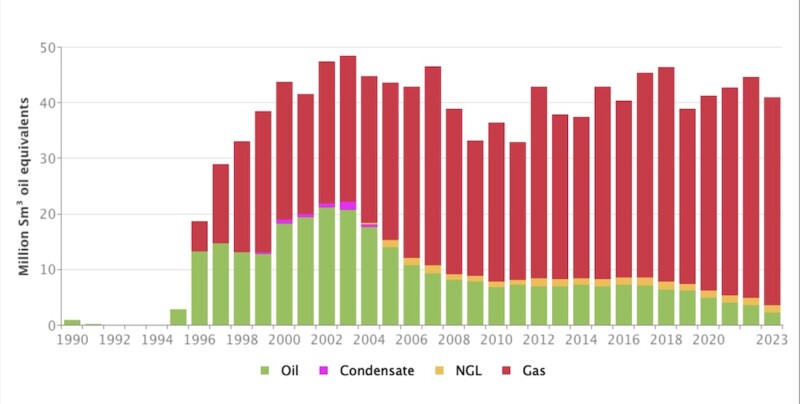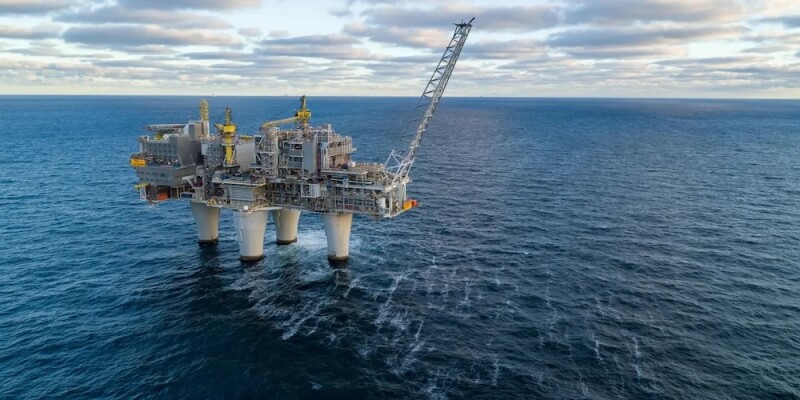Equinor’s new $1.1-billion infrastructure plan is expected to drive up gas production at the Troll field in the North Sea, contributing about 7 Bcm of gas a year when fully online.
Equinor, which operates the Troll field in 985 to 1,080 ft water depth, announced 24 May that it and its partners have approved the investment in the Troll West gas province, which is expected to accelerate production from the reservoir.
Phase 3 involves producing the gas cap overlying the oil column in Troll West while continuing to produce oil. The produced gas will flow to Troll A and onward in existing infrastructure to Kollsnes, where it will be treated, dehydrated, and compressed before being transported to Europe via the Zeepipe pipelines.
The first stage of gas production from the Troll West gas province started in 2021 and involved eight wells and a new pipeline to the Troll A platform, as well as a new inlet module. This part of the project helped extend plateau production by 5 to 7 years. Stage 2 will further extend plateau production by around 4 years and reduce the production decline over the next 10 to 12 years.

Plateau production of Troll gas has increased to 129 MMcm/D as a result of recent upgrades at the Kollsnes processing plant. The previous maximum production from Troll was 121 MMcm/D. Production from the new Troll wells is expected to amount to about 20 MMcm/D.
Stage 2 of the Troll Phase 3 project involves eight new wells from two new templates with subsea controls extended from existing templates. A new gas flowline will be laid as a tieback to the Troll A platform. Modification work on Troll A also is planned. The first wells are scheduled to come on stream at the end of 2026.
The new infrastructure will accelerate production from the reservoir equivalent to about 55 Bcm of gas, and, at its peak, the annual contribution from the new development will amount to around 7 Bcm of gas, Equinor said.
The annual export volume from Troll, Norway’s largest gas producer, corresponds to an estimated 10% of Europe’s gas consumption, according to Equinor.

Geir Tungesvik, Equinor’s executive vice president for projects, drilling, and procurement, said in a news release that the operator has chosen to use “solid, familiar suppliers,” many of whom have existing framework agreements with Equinor. Several also worked on Stage 1 of the Troll Phase 3 project, he noted.
Equinor previously awarded OneSubsea the front-end engineering and design (FEED) contract with an option for detailed engineering, procurement, and construction (EPC) of subsea production systems, including umbilicals. Equinor exercised the option, which has an estimated value around $190 million. The umbilicals will be manufactured in Moss, Norway, while structures and manifolds will be assembled in Egersund, Norway.
Allseas has the contract to lay the 36-in. gas pipeline.
Equinor awarded Odfjell Drilling’s Deepsea Aberdeen drilling rig the contract for the eight production wells on the Troll field, with drilling starting in late 2025 or early 2026. The estimated value of that contract is around $123 million, excluding integrated drilling services, index adjustment, and efficiency and fuel-reduction incentives.
The operator said it plans to award contracts to fabricate and install pipeline termination structures, umbilicals, connection pipes, and other infrastructure, as well as to install the subsea production system. The scope of this work is estimated to be around $95 million.
Aker Solutions previously won a FEED study for modifications to the Troll A platform. Evaluations will be ongoing through the summer to select suppliers for the implementation of detailed EPC work on the platform. Contract awards are also planned toward the end of the summer, Equinor said.
Equinor operates Troll with 30.58% interest on behalf of partners Petoro with 56%, Norske Shell with 8.1%, TotalEnergies EP Norge with 3.69%, and ConocoPhillips Skandinavia with 1.62%.


